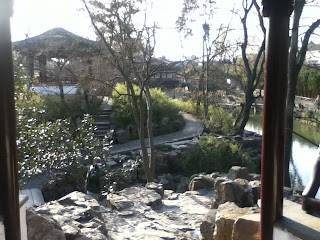I am still alive... It has been ages since I have updated and to those of you who have been following me, I apologize. I have been super busy this semester. I am not sure where all of my time went. These past few months have been filled with a lot of ups and downs. I will try to categorize them and catch everyone up with where I am in life right now.
today I will talk about teaching and classes and then in the coming days, I will talk about other subjects.
Writing Class:
This focus for our writing class this semester is "research paper." This is quite a substantial undertaking for those who speak English as their first language and therefore that much more difficult for those who are still trying to get a grasp on the mechanics of the language. This was quite a challenge for the students as well as myself... Overall, I think that it went well. From the beginning of the semester William (the other writing teacher) and I knew that there was no way that we were going to be able to finish the whole paper in only 16 weeks while meeting with each class only once per week... So, we decided to cut the paper short and break it into three sections: Introduction, Literature Review, and methodology... This project was less about finishing a brilliant research paper and more about giving the students the skills that they will need to write a good paper. (They all will need to write a 5000 word graduation paper next year. We have come to realize that last years foreign teacher did not prepare this years seniors properly for the task, this was sort of a motivation for us to work harder.) I will break down each section of the paper and describe what we expected of the students and what skills were being taught. ***Mind you, we have no text books. All of the materials that we used in this class were either collected from ESL and college writing websites on the internet or, more often, written by William and me when we were unable to find exactly what we needed.
Introduction: As a writer, I am opposed to writing the introduction at the beginning of the writing process, but instead prefer to write it when I have finished writing the body. For this class, I had to go against my gut (which is difficult given how substantial it is) and taught the introduction at the beginning of the semester. As you will see with the rest of the paper, this section was less about the writing of the introduction and more about developing skills. The skill that we ---when I say we, I mean William and I--- focused most on while teaching the introduction was "asking a good research question." In this section we taught the students to do "preliminary research" on any topic of their choosing and to begin to do some basic research on it. Then, after they were able to develop a general understanding of their topics, I asked them to "narrow their focus" to something more "manageable" and to ask a "research question" I told them that a good research question is something that they truly want to know more about... For the actual writing of the introduction, we instructed students to write 2 paragraphs: the first providing general background information on the topic and why it is worth discussing and the second providing a transition to the narrowed topic and ending in the research question. At the beginning of the semester, we planned for the introduction to include a third element: how this paper will approach the question, we delayed this until the end and have the students go back and finish it...
Overall, this process worked quite well. I received some wonderful topics and really interesting research questions...
Literature Review: for anyone who has written a research paper, you know how much a pain writing a literature review can be. As this was our students first encounter with academic research, we tried to give it to them easily and make it as simple as possible. The skills for this section were "finding what other people (experts) are saying about your topic and question" and "summarizing, organizing and paraphrasing others' ideas in your own words." For any kind of academic writing, these skills are paramount. Yet as simple as they sound, they are extremely difficult. We started at the beginning with "reliable and unreliable/ credible and questionable sources" as well as "academic, scientific and scholarly sources verses NOT" For someone who has gone through the American education system and written his fair share of academic papers, this seems pretty strait-forward. For Chinese students, whose largest writing assignment has been an 800 word essay on the college entrance exam, these ideas are not so easy... For this assignment, we required students to collect 5 reliable sources related to their topic. Next, we had them do "article dissections" which helped the students pick out the author's main idea/ research question, identify the methodology, and summarize the findings and conclusion all on one convenient form (designed by yours truly). Finally, we taught the students how to take the information from the article dissection form (which was in short-hand) and turn it into a summary using their own words. The students then did this for all 5 articles and turned in a very rough form of a literature review. --- for those of you who know that this is not the ideal way to organize a literature review, I agree with you. But, after weeks of consideration, William and I decided that this is probably the extent to which our students could handle. This was a pain to read and grade.
Methodology although this was a much shorter section of the paper than the literature review, I think that this section might have been the most difficult because it required the students to think for themselves and to what's more, to think critically. With this section of the paper, once again, we were less concerned about the actual writing and more concerned about the skills. The main skill was "design a new and unique way to approach your research question." In class we taught different types of research: quantitative and qualitative, case studies, comparative analyses, surveys, experiments etc. The we helped the students to choose a method and design a plan for collecting data. Like, the previous sections, I was very pleased with some of the student's ideas. But in general most of them were just slight manipulations of the samples that William and I wrote and used in class as examples. Chinese students have problems with creativity. I could go into it more, but I don't want to stray nor do I want to type that much.
Unfortunately, as expected, we ran out of time and had to stop with methodology and not finish the whole paper. But, I believe that the students were able to get a lot out of this class. Like I mentioned above, before my class, many students had not written much, not even in Chinese. So, I think that I pushed them quite a bit. Some, I think, really got a lot from the experience. Most however, just did what they had to to pass the course: the bare minimum. Others, failed to do the assignments as they were given and in the end failed my class. Others plagiarized and received zero's for their work. This is unfortunate. I would also like to discuss this problem in detail, but I think that might be the focus of my master's thesis, so I don't want to spoil it all now!
Conversation Class:
At the start of this semester, I got a brilliant idea about how to conduct the conversation class: "let the student's teach themselves!" I split the class into 10 groups of 5 students and split the book into 10 sections. (pairing of 2 chapters with similar themes). I then let the student groups choose which lesson they would like to lead.The first class I gave the lesson and then for the rest of the semester, my students did the class. Each group was required to give a presentation on the topic(s) and then lead the class in a discussion and then some "roll-play" activities. This was one of my best ideas. Not only did it relieve me from having to do lesson plans (which was a brilliant perk), it also provided each student the opportunity to hone their public speaking skills. As expected, some presentations were better than others, and I often had to jump in with impromptu activities and discussion questions to supplement their lessons, but altogether it worked out very well. Since I was the first foreign teacher for these students and for most of them the first time they spoke English with a native speaker, the goal for the first semester was just to get them comfortable enough to SPEAK in English. The goal for the second semester, was to get them to a point where they could use English to clearly express their ideas and feelings. I am really happy with my students because all of them are now at this level.
The Final Exams
This semester, we have no final exam for the writing class. To you and to me, this makes perfect sense: it is a writing class, there should not be a final exam. Exactly. To those above me in the program, It was not so easy to convince them. China's education is exam-based. there is a test for everything. EVERYTHING. it is all about testing and certificates for this and that... So, when we requested to replace the final exam with a final paper, we had to really fight for it. At the beginning of the semester we received the verbal go-ahead, and then submitted a formal proposal with detailed guidelines and grading procedures midway through the semester. We never received a formal yes, and therefore spent the entire term trying to convince ourselves and our students that there was not going to be a test. Not until I saw the final exam schedule and the lack of a writing exam did I realize that our idea had indeed been accepted. I had a plan to allow my students to take a "fake final" and I would replace the grade on the final with the one from their paper. Thank God, it did not come to that. Needless to say, it was quite a tense semester. On top of that, my teaching partner is completely useless. Actually more than useless. He is supposed to help me with my classes, but instead he only contacts me when he needs me to help him with something. For this entire year, both first and second semester, he hasn't know what classes I am teaching. No joke. He has asked me 4 times: twice at the end of last semester and twice within the past couple of weeks. All of the contact with the department this semester has gone through William's TA, who despite being not very knowledgeable due to being new to the university has been very helpful.
The conversation final was straightforward: 10 minute oral exam with a "free-talk" about a randomly selected topic from the class. Students tested in groups of three. Although this was extremely exhausting, it was a lot of fun as I was able have wonderful conversations with all of my writing students. Almost all of the groups got off topic as we strayed and found more interesting things to talk about, but I didn't mind because I wanted the final to resemble a natural conversation as closely as possible and in real, natural conversations that is what happens. Unfortunately, these conversations also ran over a bit.. when you go 2 minutes over 24 times... it adds up a bit...
Students
Being on the other side of education (in front of the class and not in the seat) has been a very eye-opening experience for me. When I was a student, I was only concerned with myself and my own education. As a teacher, I am responsible for the education of 400 individuals. In this past year, I have really thought a lot about being a student and being a teacher and just education in general. The topic for one of the last conversation lessons was "education." One of the groups in their discussion asked the question "what makes a good student" (ie what qualities must a student possess to be considered "good") and then what makes a "bad student." The students answers were almost all the same "good students get high scores and do not break the rules." Bad students, by default, are those who fail to obtain high scores and/or break the rules. This I can agree is a pretty standard position. My students then asked me to answer the question. I thought about it for a minute and then said "a good student is a student that tries. a good student is a student that takes responsibility for his or her education. a good student (especially in language) is a student that is always looking for ways to grow and improve and not just to achieve high scores. A bad student is a student who doesn't care. A bad student does not try. A bad student does not want to improve and does just enough to get by. A good student can get poor marks, a bad student can get high marks. the quality of a student cannot always be measured with a test score." In college, I believe, that it is up to the student to be self motivated. In primary and secondary education, the burden of motivation also rests in the hands of the educators, but I think, as adults in college, student should be responsible for themselves. By this definition, I have seen my share of good and bad students. Unfortunately, the majority falls into the "bad student" category: doing enough just to get by and not really trying to improve. Some days, my classes were so unresponsive, I felt like I was teaching to a wall. It was very frustrating. In every class, however, there are a handful of "good" students who always ask questions and are constantly trying to improve. These students are not always the ones with the best English skills, but in these students I saw the greatest improvement.
I think that I have typed enough for today, I know there is much more to say and I want to say it, but I don't really know how to categorize my thoughts or how to continue. If you have any questions about these or any other thing that I mention or about this experience in general, please comment or email me and I will be happy to talk with you personally!
Once again, thanks for reading and sorry for such a long gap in posts.
Adam





































































